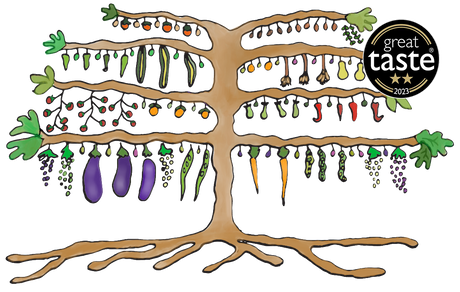
My wife, my partner, my love, Maggie Whitman, is a fifth generation farmer. For the past twenty years, after a career in classical music, she has been a pagesa, most of them as a member of a sustaining mountain village cooperative here in Catalunya.
As I write she is out in the olive grove, sweating, ignoring bramble scratches and insect bites, clearing around the base of the arbequinas in preparation for harvest next week. Her ankles bear the scars, her face reflects the need. The Whitmans are people of the land.
In the maelstrom of now, this world of uncertainties, the fundamentals of having to somehow find meaningful practice, a reason to be, peace, burgeon into focus. It can be hard to make sense of anything. Yet, whether it is a window box, a small garden or a farm, it is an unassailable fact that there is something profound about natural labour for our hands, a grounded, meaningful rhythm to counter the rudderless spinning of the mind.
Maggie’s father would be so proud. I barely knew him. He died just four years after Maggie and I fell in love, and already by then he was fading into the mists, anger and tragedy that is Alzheimer's. But I know him better now.
I am home, back on our patch of The Priorat, taking deep breaths, pushing loaded wheelbarrows and processing change, deep change that Maggie especially needs the labour in the grove and garden to manage. Her mother Beryl has now passed away, an extraordinary spirit, a nurse, a font of wisdoms, a 90-year-long light. Hence, weight upon weight, the family farm back in England is being sold.
Bound by responsibilities as co-executor of the estate I donned a mask and journeyed, willingly as a son in law, reluctantly as a contributor to the nicotine seam of pollution the almost empty jet aircraft rose through en route north. Maggie, meanwhile, stayed home and worked what is now the Whitman farm, seeking at the same time a path through a forest of emotions. We had been back at her mother’s bedside in March before she passed away, hours before lockdown, able to just be with her, to love and care. But the pandemic denied Maggie the closure of the graveside and that collective thanksgiving.
David George Whitman was his name.
I stood and stared for quite a while at his writing desk which then slowly emerged from beneath the chaotic papers that had overwhelmed it during all the 28 years I had known it; like the confusions of the illness that took him too young. But it held so much: Love letters, legal files, farming and accounting certificates, farming journals, architectural plans of the evolution of the farmhouse as and when they could afford it, and photographs, so many photographs. There was so much to sift, flowing not just from that desk but from all corners of the home and farm buildings. Daughter Ella, was with me, helping to sift and sort so many echoes of two lives.
Then there were the films. 8mm films. Reels of them, jammed into a box under the stairs. David, the gentlest of men, wise and kind, had left these too, a rare and immeasurable record of life, love soil and toil. Ella has now had them copied, digitised, and they take us and our children to where we need to be right now, to the heart of family, a family steeped in the land. There is peace in that. And some sort of sense, of self and the seasons.


1 comment
Lynda Christieson on